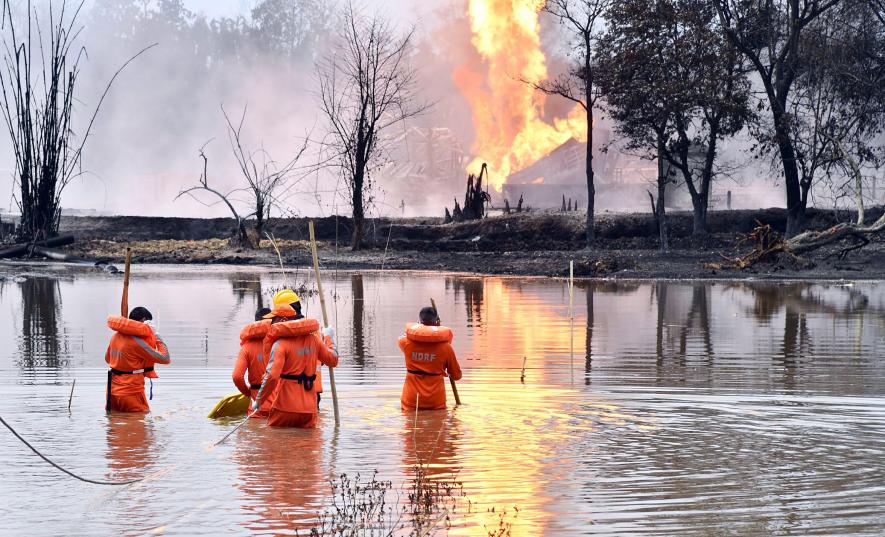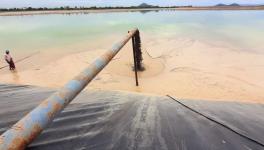Oil, Natural Gas Companies Fail to Learn From Baghjan Disaster

National Disaster Response Team (NDRF) personnel carry out search and rescue operations. Image Courtesy: ANI
New Delhi: Oil and natural gas companies continue to flout environmental norms despite the havoc unleashed by the Baghjan disaster upon local communities and the environment of the ecologically fragile rainforests of Assam more than two years ago. While the victims of the Assam oil well accident still await a normal life, a string of recent court cases shows that no lessons have been learnt from the disaster.
On August 5, the Southern Bench of the National Green Tribunal (NGT) found state-run oil major GAIL (India) Limited guilty of having flouted guidelines on management of coastal zones while laying a natural gas pipeline along the Bay of Bengal. The Bench directed the Tamil Nadu government to take “appropriate action”—including imposition of penalties if necessary—against the hydrocarbon company.
“It is seen from the report submitted by the Tamil Nadu Pollution Control Board that a portion of the area through which the pipeline is laid falls in CRZ [Coastal Regulation Zone] area notified under the CRZ Notification, 2011 & 2019 and without getting the CRZ clearance, they have started the work,” the NGT ordered.
“Since the laying of pipeline in certain portion requires the CRZ clearance, GAIL is directed not to lay down the pipeline without obtaining necessary CRZ clearance and other permissions required under the environmental laws,” the tribunal added.
The Bench, comprising Justice K Ramakrishnan and expert member Satyagopal Korlapati, directed the Tamil Nadu State Coastal Zone Management Authority too, apart from the pollution control board, to impose an environmental compensation upon the company for damages that could have possibly resulted from the violations.
The order came upon a suo motu case that had been taken up by the NGT following an alleged gas leak from a GAIL pipeline in a populated area known as Sembanarkoil, in Nagapattinam, on July 22, 2020. The gas leaked from a section of an underground pipeline used by GAIL to transport natural gas to its terminal in Memathur village (Memathur Cauvery Basin), in Tamil Nadu’s Nagapattinam district, from the Madanam oilfield of Oil and Natural Gas Corporation (ONGC).
The 29.5-km pipeline passes through 18 villages of two Taluks (administrative units) of the district. The leak—coming close on the heels of the Baghjan disaster—had panicked villagers after pressurised gas rose to a height of around 15 feet, according to media reports.
However, field enquiries conducted by the State Pollution Control Board and the local district administration revealed that there was no gas leak as the pipeline was not operational. The incident apparently resulted in “throwing up of dust” to a height above the ground when the pipeline was being cleaned, as per several governmental agencies. Nonetheless, it was revealed during the course of enquiry that GAIL had not obtained CRZ clearance from the Centre before laying the pipeline.
The NGT issued the order barely three days after imposing a hefty penalty on ONGC for causing environmental degradation in East Godavari and West Godavari districts of Andhra Pradesh. On August 2, the tribunal’s Chennai Bench had directed ONGC to pay a penalty of Rs 22.76 crore to the State Pollution Control Board of Andhra Pradesh after it was found guilty of flouting environmental norms in the Krishna-Godavari Basin.
“Andhra Pradesh Pollution Control Board is also directed to take further action (if any) required against the third respondent [ONGC] for noncompliance of the conditions or operating the unit against environmental laws after following the due process of law,” the Bench said issuing additional directions in its order.
The order was issued by a Division Bench of the tribunal comprising Justice K Ramakrishnan and expert member Saibal Dasgupta upon a petition filed in 2020 alleging that ONGC—as well as its sister concern GAIL—were involved in a lot of polluting activities in around 100 villages of East Godavari and West Godavari districts. This included alleged discharge of polluted water into the sea, water bodies and open land, and alleged instances of gas leak due to installation of insufficient detection systems.
A six-member expert panel appointed by the NGT to ascertain the veracity of these allegations noted in a report filed in April 2021: “M/s ONGC and M/s GAIL in KG [Krishna-Godavari] basin are more focused on production and extraction of oil and gas, which is essentially required for the development, but the environmental aspects and pollution mitigation measures within their premises is not much focused.”
Based on the panel’s report, the NGT issued a series of directions to ONGC to prevent further pollution in the area. In January, the tribunal directed the panel to inspect the units yet again to verify the status of compliance of its directions. However, the committee observed that though there had been improvement, the units were yet to achieve full compliance. A few serious and significant violations were also observed by the committee in certain units of ONGC.
“It is needless to say that government organisations are expected to be more compliant units and they should be a model for other private sectors … the Andhra Pradesh Pollution Control Board is directed to take steps to recover the amount and utilise the amount after preparing a remediation plan for the purpose of protecting the project-affected area in consultation with the district collector of the concerned district and that amount must be spent in a scientific manner which will be helpful for the purpose of benefiting the project affected area,” the Bench further ordered.
Experts are of the opinion that the Centre must use its plenary powers in order to ensure that oil and natural gas companies are fully committed to environmental protection lest there occurs another Baghjan-like incident.
“The judgements of the Southern Bench of the green tribunal are a stark reminder to our public sector industries that they should, in the very least, be committed to legal and statutory norms for the protection of the environment. Otherwise, it is only a matter of time before we witness another massive environmental disaster like the one in Baghjan,” Guwahati-based environmental lawyer Debojit Das told Newsclick.
It is the “right time” for the Central government, according to Das, with its plenary powers under Section 3 of the Environment Protection Act, 1986, to “direct public sector units to fully comply with environmental norms and also remain committed to India’s international commitments, including the Paris Agreement”.
There have been numerous gas leaks before the Baghjan disaster apparently caused by negligence of oil and natural gas industries. In June 2017, a gas leak from an ONGC pipeline in Antarvedi village, in East Godavari, caused panic among farmers of the region and their families even though no casualties or injuries were reported. Similarly, around 167 families had to be evacuated as a safety measure from Tadikonda village, East Godavari, following another gas leak in September 2016. In June 2014, at least, 19 people died and several others injured in the explosion of a GAIL pipeline in Nagaram village, East Godavari. A high-level enquiry conducted by the Union ministry of petroleum and natural gas had nailed GAIL for its negligence in replacing the corroded pipeline despite complaints, resulting in the disaster.
A few years before the Baghjan disaster, at least, eight workers were injured in a flash fire at Reliance Industries Limited’s Jamnagar Refinery in November 2016. A green signal for expansion of the refinery—to increase the installed capacity to 41 million tonnes from 35.2 million tonnes—was given by the Expert Appraisal Committee of the Union Ministry of Environment, Forest and Climate Change (MoEF&CC) in December 2018. However, the NGT found in September 2020 that the refinery was among several industries disposing hazardous waste in a reckless manner.
Other refineries found by an expert NGT panel to have been disposing hazardous waste unscientifically belonged to Indian Oil Corporation Limited in Panipat (Haryana), Mathura (Uttar Pradesh) and Barauni (Bihar). An expert panel constituted by the tribunal found that these refineries generated spent catalyst exceeding the limit authorised by the pollution control boards of the respective states in which these were located. A four-Judge Bench of the tribunal headed by its chairperson Justice Adarsh Kumar Goel ordered all state pollution control boards and the Central Pollution Control Board to ensure that these units complied with the Hazardous Waste Management Rules, 2016.
The biggest onshore hydrocarbon project in the country—a joint venture between private explorer Cairns Energy and ONGC—has also allegedly violated environmental norms. A petition filed in the NGT in 2019 challenging the environmental clearance granted to the hydrocarbon block in Barmer district, Rajasthan, however, turned down in May on the ground that it was “time-barred”.
The petition alleged that the proponent had felled a large number of trees to establish well pads on the banks of Luni River, the largest river in the Thar Desert. The green cover necessary to be maintained around an industrial establishment to minimise the effects of pollution was therefore diminished, it was further alleged. The petitioner pointed out that wells and surface water were being polluted as harmful chemicals from the well pads seeped through the soil into the nearby fields.
Skin diseases and eye irritation were allegedly rampant in the nearby villages due to fire and smoke emitted by the chimneys, the petition further alleged adding that high levels of noise pollution caused by heavy machinery of the project proponent were also reported.
The veracity of these allegations was enquired into by MoEF&CC, which had issued the environmental clearance after the petition was filed. The reports finalised following the enquiry—as well as separate enquiries conducted by other governmental agencies, including the Rajasthan State Pollution Control Board gave a clean chit to the joint venture.
In a judgement issued on May 30, the Bench, comprising Justice Sheo Kumar Singh and expert member Arun Kumar Verma, observed: “The oil block is important to the countries (sic) energy security and the oil production places (sic) pivotal role and contributes approximately 25% of (sic) the total domestic crude oil requirement.”
The writer is an independent journalist.
Get the latest reports & analysis with people's perspective on Protests, movements & deep analytical videos, discussions of the current affairs in your Telegram app. Subscribe to NewsClick's Telegram channel & get Real-Time updates on stories, as they get published on our website.
























